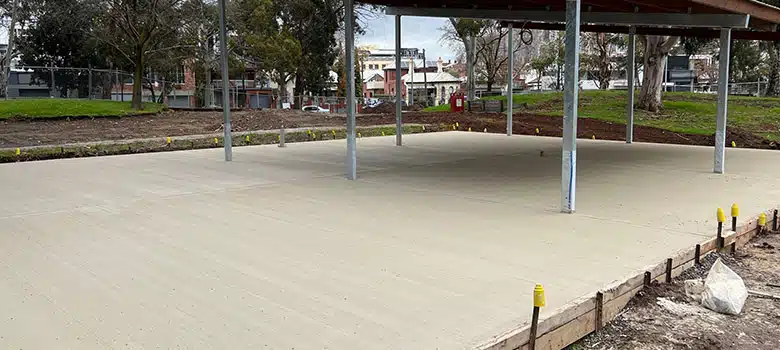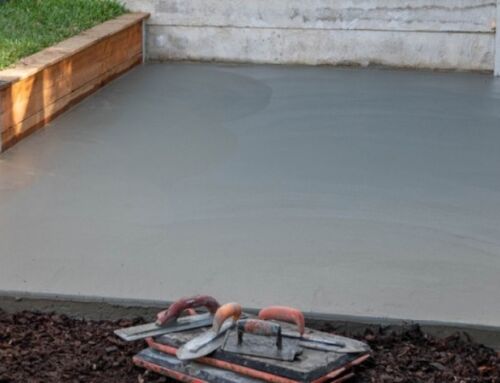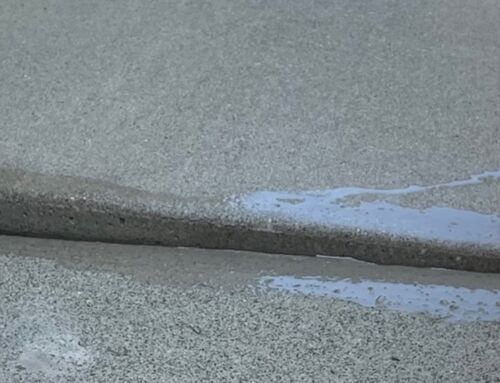Seeking to save on your slab? It will probably come down to the project parameters.
Every project needs a starting point, and for home and commercial construction alike, it often starts with a slab. These foundational elements are essential for providing a sound footing for the rest of the structure to be built upon.
While indispensable in nearly all building projects, it can help to understand the prices associated with creating a slab so that you can budget accordingly. For smaller projects, such as concrete driveways that are somewhat slab-like in nature, you can also use budgeting to indicate whether you have room for upgrades like coloured concrete or aggregate. Let’s take a closer look at how much concrete slabs cost and what you can expect during the installation and build process.
What are concrete slabs used for?
Most broadly, a slab is a thick and flat piece of material that serves, typically, as a foundation for something. In construction, concrete slabs are widely used as a structural component in houses and other buildings. For larger projects that are required to hold a lot of weight, reinforced slabs will contain steel rebar (or reinforcing bars).
Slabs can also be, technically, used in exterior paving and as driveways, though we don’t really refer to them as slabs at that point. They also tend to be much thinner when used for paving projects.
Interested in a driveway slab? Read on: Concrete Driveways: Benefits and Costs in Melbourne, Victoria
What affects the cost of concrete?
There aren’t too many factors that get involved when it comes to pricing out a concrete slab. But those that do arise can widely sway the cost in one direction or another.
Size
This is the biggest indicator of cost since it directly correlates with how much concrete material will be needed to complete the project. The larger the slab, the more concrete will be needed to fill it in properly. Labour costs will also go up for bigger projects since they require more people to manage the mass of material and install it in a timely manner.
Thickness
Area isn’t the only factor related to size. Thickness is a major indicator of how much material will be needed, and thicker slabs with a higher volume of concrete are going to drive the costs up more. Slab thickness is actually dictated by Australian Standards and should usually fall between 85-100mm. While these tend to be more stable, they also require more work overall. That’s why you’ll sometimes see quotes for concrete listed in cubic metres rather than square metres.
Reinforcement
Bigger construction projects might call for reinforced concrete, and that comes in two main varieties. We already mentioned rebar, which are steel rods that come in different thicknesses and can be inserted into the wet concrete to strengthen it once it all dries together. The other option is a wired mesh that typically comes as a gridwork and is laid into the wet concrete. Keep in mind that while concrete costs tend to remain fairly stable, steel costs can fluctuate based on demand and the economy, so this could be a major variable if you need it.
Complexity
The more notches and edges to a project, the more footings and framework are going to be needed in place to pour the concrete. That adds to the prep work on the job and, also, the labour that will go into it.
Labour
Speaking of labour, some companies break out the costs for materials and labour when providing quotes for concrete projects, so be sure to check with yours when you enquire. That said, bigger and more complicated projects are likely to require more people to help with the heavy lifting, prep work, and pouring of the concrete.
How much do concrete slabs cost in Melbourne?
Concrete slabs are an essential item to budget for whether you’re paving a driveway or preparing for a new home to be built. Depending on how the factors above come into play for your exact project needs, you can expect to pay anywhere from $60-$100 per square metre for plain concrete for a slab. Labour costs are going to add to this in most cases. For reinforced concrete in your slab, the average cost is $65-$90, with rebar typically costing $30-$45 per metre.
Calculating with a driveway in mind? Here’s our guide: How Much Does a Concrete Driveway Cost In Melbourne?
Do concrete slabs require maintenance?
There’s likely little you will need to do with your slab, depending on how you are planning on using it. For construction purposes, the slab will disappear under other building materials and do its job as the foundation of the home without being seen or recognized again.
For driveways and flooring, however, there are some things you can keep in mind when it comes to caring for your slab. First of all, you might want to invest in also sealing your concrete to protect it from the elements and foot (or vehicle) traffic. This will help prevent issues like cracking, flaking, and discolouration in the future.
Aside from this, it can be helpful to keep your slab clean on a regular basis. If you’re going with concrete as a flooring solution, you’ll likely have this covered in your regular vacuuming or dusting routine. But if you’re looking at your driveway and thinking it looks a bit shabby, you can hit it with the garden hose to loosen dirt or debris that might have settled there.
Create a solid foundation with Concept Concrete
When it comes to creating a new slab for home projects, the cost will always be proportionate to the size of the slab itself. It’s important to make sure that you work with an accurate and reliable concrete contractor who will provide you with exact costs based on your measurements and requirements.
At Concept Concrete, we offer free and fast quotes for projects of all sizes so that builders and homeowners alike can be clear on exactly what they will have to budget for without any surprises along the way. Our hassle-free process is designed to create a fast turn around on projects so that you can get moving forward with your build. We also offer a 78-month warranty on structure.
To start budgeting for your concrete slab today, just call us on 1300 366 343 or get a quote online now.



